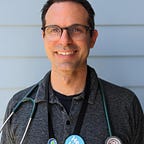From the Frontlines: How to End the Pandemic
Last month, I received a phone call from one of my patients. Her nephew works as an afterschool teacher and had not yet received his COVID-19 vaccine. “Will you call him?” she asked. I knew what this meant to my patient; she has lost five family members to COVID-19, including her sister. At the end of my clinic, I picked up the phone. “Erroll*, I have heard so much about you. Your aunt gave me your phone number. Do you have a quick second to chat?”
Like so many of my fellow healthcare providers in Louisiana, navigating this pandemic has meant many hours answering our patients most pressing questions. Where can I get tested? Is ibuprofen better or worse than Tylenol? What is hydroxychloroquine? Explain to me the difference between DNR and DNI? Should I wear a mask? Will you Zoom into the funeral? What is MRNA? Do you have any extra doses? Can you call my nephew?
According to the Kaiser Family Foundation, “Throughout the coronavirus pandemic, majorities of U.S. adults have said their doctors and nurses were their most trusted sources of information about the coronavirus and eight in ten have said their doctors are the ones they will turn to when deciding whether or not to get a COVID-19 vaccine.” I, along with my colleagues, deeply understand this responsibility.
In Errol’s multigenerational home, there are two adults working, and four young kids who need full-time attention since his mother passed. His hesitancy was simple: his caregiving responsibilities meant he could not risk being unwell for 24 hours. He told me stories about his mother and how she always prioritized her children’s health over her own. After our conversation, I met him on his way home from work for his first vaccine and then he received his second vaccine at my clinic four weeks later.
I am an infectious disease physician at CrescentCare, a federally qualified health center in New Orleans. We have leaned into the pandemic because our patients have been disproportionately impacted. We have tested over 20,000 patients since March 2020 and have now vaccinated 3,500 New Orleanians.
I oversee our COVID program with a staff that includes three nurses, a vaccine manager, operations specialist, registration staff, and myself. As we have transitioned from COVID testing to vaccination, our spirits have been lifted, but the money doesn’t match. COVID testing is billed at $52–161 per visit. Vaccine administration is reimbursed at just $16.94 or less.
Vaccination is more than just a jab. To overcome hesitancy, it requires a trusted healthcare worker — who will answer questions about side effects, dispel the misconceptions while also mourning the lives of those lost, cheering for regained employment, and lending support through the profound emotion of what we have been through. It requires the entire infrastructure that supports that healthcare worker plus the extra sweat to ensure no vaccine dose is wasted.
Over the next few months, reaching those not vaccinated to achieve the goal of 70% by July 4th laid out by the Biden administration will take even more effort. As of today, 43% of New Orleanians have been vaccinated. My primary care colleagues, at CrescentCare, could have up to 57% of their 600-person patient panel to engage and discuss the importance of vaccination. As a clinic, we have redeployed primary care resources to COVID but due to the low reimbursement rate, vaccinations cannot be our only priority. This pandemic has reinforced the critical importance of primary care to treat the underlying conditions that make COVID more deadly.
I applaud the Biden administration for its focus on vaccinations, offering businesses tax credits to help employees with paid time off, and funding the American Rescue Plan. Unfortunately, this is not enough. We are now in a race against more transmissible variants and have to engage those who are even harder to reach. The vaccine must be reimbursed at a higher rate, with more flexibility. Medical staff should be adequately funded to call their patients and encouraged to leave the clinic to reach patients where they are.
Recently, CrescentCare took to the streets to vaccinate outside a popular nightclub at an event hosted by DJ RQ Away. It was a success, with 164 patients vaccinated in three hours! Those vaccinated were young and, like Erroll, just could not make it to a clinic for vaccination. None of those vaccines were reimbursed by insurance — it would have been absurd to ask for insurance cards at a nightclub. But we know this work is what will protect Louisiana and end the pandemic. With Mother’s Day this weekend, CrescentCare will be supporting a “Go Get It For Your Mama” vaccine event with a free mimosa and plant as an incentive. And, so CrescentCare is turning to individuals and businesses for support to continue to do vaccination outreach events.
We have access to safe and life-saving vaccines. It’s vital that we use the next three months to reach the goal of 70% by July 4th. We urgently need to find new and creative solutions; to end this epidemic, frontline physicians like me need the Biden Administration to take action and fully fund this work. Together, we can do more. We owe this level of commitment to Erroll and his mom.
https://www.crescentcare.org/crescentcare-is-bringing-vaccines-to-the-people/
*Name changed to respect patient privacy
